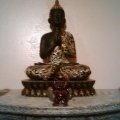How can someone practice no-self and improve his self at the same time?
 Kotishka
Veteran
Kotishka
Veteran
This is something I encounter constantly in Zen texts.
It seems the spiritual path has nothing to do with developing a self. Of course, Buddhism has this important concept, anatta. But the spiritual path, particularly in certain advanced/new practioners, has been highly benefitial for them and those around them. I understand it as being self-less, but there is still an object / self as "To help others I must improve my habits / to help myself I must reduce my own suffering".
I tried sitting on this and ended up confusing myself even more. I picked up Psychology as a result of my interest towards Buddhism to help people as I've always felt fond of listening and helping others. Is this feeding a self that has no existence, thus a hindrance to the path? I do acknowledge that there is a small trap to this. I work myself for qualifications to validate myself to be able to work.
Maybe some of us -myself included- should accept that many rounds of rebirth are what's coming up for us, just like the bill after a long binge at the pub. Or maybe that there was no bill nor pub to start with. Or maybe at some point the self has stretched enough to provide the trampoline to jump into the non-self?
Thanks for reading.




Comments
First make the cake. Then, Ice it.
Remember, nothing is permanent. So there isn't a permanent self; it's always changing. And with dedicated Buddhist practice, it can evolve in a more healthy, positive direction.
The teaching is about not becoming attached to a fixed idea of self, like some people do, patting themselves on the back for being intelligent or generous or however it is they flatter themselves. That's attachment to self. Meditating on attachment/grasping, dukha and its sources, on ever-expanding circles of love, on letting go of envy and jealousy, etc., with the goal of achieving an Enlightened state, is not attachment to self. It's guiding the evolution of self in the right direction.
Once Enlightenment is achieved, one leaves ideas of self behind; they're irrelevant, and are abandoned like a snake shedding its skin.
What about the enjoyment of spiritual practice? Such as positive emotions toward the challenges of elements of spiritual practice, the progress the self has made, freedoms from mental bondages, fondness of literature, etc.. Do these fall under flattery of self and an attachment to self? I am the one doing the enjoying of the spiritual practice after all. Is it that the self can enjoy but not be conditioned to seek the enjoyment? I'm not about to eat these strawberries expressionless but I won't long for the sensation of eating them after they are eaten. I will be on to the next thing.
I feel like I've asked this but couldn't find where. Apologies if this has been answered before and thanks in advance for any clarity offered.
Through developing "Awareness"....
As Awareness of non self begins to develop (meditation and more mediation) the clinging aggregates which manifest the solid sense of a permanent self that is experienced, gradually begins to dissolve...
The habitual clinginess of desire and aversion which reinforce this sense of permanence starts to loose their grip , and in doing so, a more natural/unconditioned flow of aggregates comes to the fore ...I guess one could call this "Self Improvement"...
A self which is no longer bogged down...

I heard it said recently that philosophically the ultimate is easier to understand than the conventional. So sure, ultimately there's no self, its all interdependent. So in what way do we continue to function and act in the world? Contextually, dependently. We don't cease existing, we slowly begin to understand how we interact psychospiritually with the world around us. Importantly that also means that improving our own well being has an impact on the world around us.
the answer is in Shantideva's words..
Interesting question! I think it's natural to spontaneously enjoy a pleasurable activity. I don't see any attachment there. The joy comes and goes, it arises and falls. You just let it flow through you, you don't cling to it. (Do you?) You say, you'll enjoy the strawberries in the moment, but you won't long for them after they're consumed. That sounds like non-attachment to me.
Similarly, as the Dalai Lama says, when you experience loss, like the death of a loved one, it's natural to experience grief. You let the grief flow through you, you don't hold it back and try to pretend you're above it all, or something. You just let it flow.
It's ok to experience sadness and grief, as long as you don't get stuck in it. It's a human thing to feel sad at the loss of a loved one, and we are human. It's also natural to experience joy. But if we get stuck in grief and can't move on, or if we go around chasing after joy, like OD-ing on chocolate chip cookies or becoming bliss junkies chasing after the bliss state from certain types of meditation, that's attachment. Then one risks having the depression or the bliss-seeking take over one's life. One loses the ability to lead a balanced life and attend to day-to-day obligations and chores.
Ah thank you, this was helpful to my understanding. I certainly see how this happens with in some aspects of my life but not others. Apologies if I made it sound like I have no attachments. The strawberries was a scenario to help me understand. While I can go without major desire for more strawberries, there is much I still work to let go.
@ShanJieshi2 These words?
My take is that the conditional and conventional "self" is an illusory tool. In the Two Truths teachings we have the subjective and ultimate sides of being. One points to individuality and the other points to non-individuality. Looking at it this way reminds me that absolutely, there are no others. To help others is to help myself because there is no true separation there. Helping my conventional self stay as healthy as possible in body and mind makes me of better use to other conventional selves.
To say it has no existence is an extreme stance. It is not that these conventional selves don't exist, it is that they don't exist by themselves... They depend on everything working together.
It almost seems counter to logic but non-self doesn't point to non-existence. It points to inclusiveness.
Thanks for sharing.
Thank you all. The mists have been overcome....for now...!
Tee Hee, whilst our beloved Ice Maiden @federica aka ‘The Hoff’ is both a cake and a topping … others have provided ways to insight the ego/being … rather than inciting it …
Who do we think becomes enlightened? Ordinary people!
You can bet your buddhahood on it …
Crazy Buddhas, idolised and idealised Buddhas. All sorts.
Right. To say that the self doesn't exist = nihilism. The Buddha cautioned against nihilism. But he cautioned against eternalism as well. Everything is in a state of change and flux. And, as David so aptly put it, everything depends on everything else working together.
Another way I've heard it explained, is that we're not to get attached to a self-identity. People do, you know; they think of themselves as all kinds of things: a parent, a "family man", a member of whatever profession they've chosen (what happens when they go through a career change though? Change is an integral part of life), a problem-solver, a creative thinker, a generous person or a frugal person, etc. These are all constructs people invent to describe themselves. To become invested in that identity = ego. Ego leads to suffering, if for example, life circumstances occur to force a change in our "self"-image. It's not something we should get caught up in.
And kotishka hit the nail on the head as well, when he said:
Or maybe at some point the self has stretched enough to provide the trampoline to jump into the non-self?
Exactly. It's a tool we use to help us move toward Enlightenment, or egolessness. And to simply get through our mundane lives: to open a bank account, to apply for a job, to lead a group, as the Buddha did, or to find ways to lighten the suffering of other sentient beings in whatever way our unique individual gifts may allow us to do, or to provide others with life skills. But our focus should be on the process and the goal, not on how great or special we are to be achieving what we've set out to do. The latter is attachment to self. The former is Right Livelihood, or Right Motivation.
The self is just a tool, not a be-all, end-all, or something like a material acquisition that enhances our status in the community, a badge to wear. Forget the badge; just get on with doing what needs to be done to bring about positive change.
those were not Shantideva's words, but what someone said about Shantideva.
I like Thanissaro Bhikkhu's take on anatta. See, for example, A Healthy Sense of Self, which is a part of his collection called Selves & Not-self.
This is quite long but hopefully addresses the original question:
https://tricycle.org/magazine/psychology-awakening/
Note, it is an article for subscribers only…
? Really ?
I can scroll and read without subscribing and dismiss the subscribe button.
… Meanwhile the idea of self transcendence used in humanistic psychology may be helpful …
https://en.m.wikipedia.org/wiki/Self-transcendence
It fades out the article after one paragraph for me, saying “subscribers only” and asks me to log in. No button, no ability to continue.
To be in the world but not of the world is always going to be difficult.
The world aka samsara beckons.
It let me read the whole article and I'm not subscribed. Though there's a bar at the bottom indicating I have 0 articles remaining. Maybe we get a freebie?
Article is amazing by the way. I didn't realize just how big an obstacle using emptiness as spiritual bypass for resolving the self was.. As a now recovering resentful people pleaser, this trap of trying to become empty to avoid self vs allowing self to be self is nearly invisible to me.
I would urge you all to read a book called "How To See Yourself As You really Are" by HHDL.
Read it twice